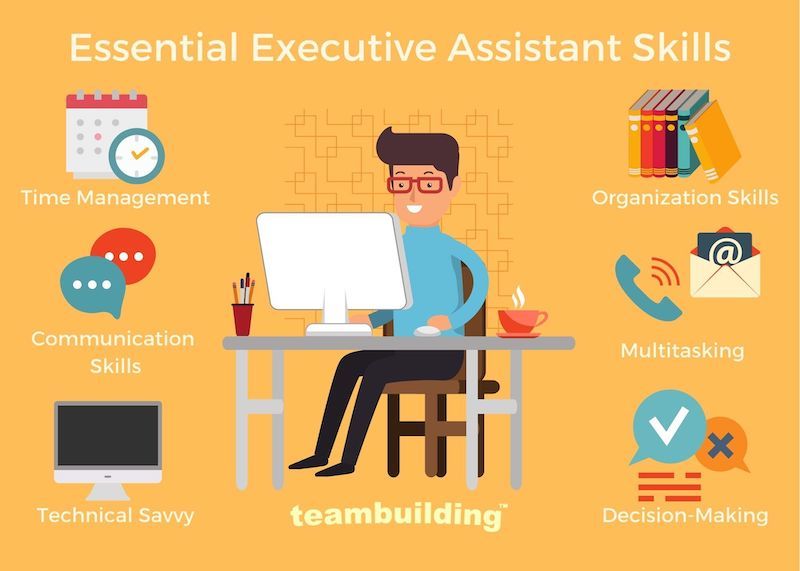You discovered our list of top executive assistant skills.
Executive assistant skills are qualities and abilities that help high-level assistants thrive in their positions. Examples of these competencies include multitasking ability, decision making skills, and time management. Executive assistants are also commonly referred to as EA’s, executive secretaries, and personal assistants.
You can learn these skills from executive assistant books and show gratitude for them on Virtual Administrative Professional’s Day. These characteristics are similar to virtual assistant skills.
This post contains:
- executive assistant key strengths
- executive assistant competencies
- technical skills for executive secretaries
- executive secretary qualifications
- personal assistant skills
Here is everything you need to know.
List of executive assistant skills
From persuasion to attention to detail, here is a list of skills every executive assistant should possess.

1. Organizational Skills
Organizational skills are one of the top executive assistant key strengths. High-level assistants juggle many tasks and large quantities of information. Without an orderly system, assistants can easily fall behind, miss deadlines, or lose track of important details. The organized assistant can find answers quickly and keeps operations flowing smoothly. These individuals are calmer, more efficient, and appear more competent.
You can improve your organizational skills with project management software or by reading books on project management.
2. Multitasking
Rarely does an executive assistant have the liberty to move at a leisurely pace and focus on one mission at a time. Skilled assistants must be multitaskers, ready to pivot at a moment’s notice when an urgent need arises. Then, they must resume the previous task when the crisis ends. Often, this shift occurs many times throughout the day. Problems present themselves and colleagues have questions. Phones ring, plans change. Savvy executive assistants must take interruptions in stride and learn how to prioritize effectively.
Check out this list of focus books to develop that skill.
Want some free team building tools?
$49 value (100% free)
- 100+ fully tested icebreaker questions
- 24+ themed Bingo generators
- 5+ PDFs (including the 8% Rule)
- 2024 team building calendar
- and more...

Enter your email for instant access
3. Time Management
Time management is one of the most important executive assistant competencies. Assistants’ duties tend to be time-sensitive. Staying focused and completing tasks on time is crucial for job success. Not to mention, executive assistants receive steady streams of work, and can easily fall behind if they do not stay on top of assignments.
Good time management skills keep operations flowing smoothly, and reduce stress levels. Assistants need a good sense of which jobs to prioritize, and how much time to spend on each endeavor. When a task takes longer than expected, good assistants know when to reach out for help or delegate the job to a teammate.
Also, capable assistants know how to carve out efficient workflows and set boundaries. If executive assistants do not cycle through responsibilities within the workday, then they can find themselves working late hours or overworking. To avoid burnout, the smart assistant stays focused during work hours and unplugs at the end of the day, responding only to emergencies after hours.
Here is a list of the best books on time management.
You can manage your schedule with time keeping software.
4. Communication Skills
Communication skills are crucial for executive assistants. First, assistants must know how to speak and write professionally to executives, business partners, and high-level clients. Grammar is crucial, as are writing conventions. For instance, assistants should know how to properly format a formal business letter, and should triple check spelling before sending emails.
Tone is important too. Savvy assistants know when to strike a more personal and friendly tone and which situations call for strict formality. Length and medium should be appropriate too. A passing mention or a memo may suffice for lesser news, while bigger announcements or issues merit a detailed email or formal report.
Executive assistants should also be able to give directions. Top assistants often oversee other administrative assistants and coordinate departments on special projects. These responsibilities require the ability to give clear instructions and communicate respectfully with staff.
You can play vocabulary games to improve your communication.
5. Data Entry
Data entry is one of the most desirable technical skills for executive secretaries. Record-keeping is one of the key functions of assistants. Executive secretaries often take and edit meeting minutes, upkeep databases, and manage filing systems. These individuals must be able to input information with a high degree of speed and accuracy. They must also know how to retrieve data quickly.
Basic technological skills are also helpful. In a perfect world, the IT department would answer the call every time a spreadsheet went wonky. In reality, issues often take time to diagnose and fix. Exceptional assistants are able to find workable solutions in the meantime to ensure important data is accessible.
6. People Skills
People skills are absolutely essential for executive assistants. Every day, assistants interact with dozens of people, both inside and outside of the organization, digitally, on the phone, and in person. To excel in the job, executive assistants must develop relationships with many of these folks. Assistants often have to ask for favors, and having a rapport makes a big difference. Folks are more inclined to lend a hand to pleasant individuals. Extra points if the assistant has helped the potential helper in the past, or remembers personal details like kids’ names or recent vacations.
Most importantly, personal assistants must develop positive relationships with their executives. The best executive assistants are personable yet tough. They can tell when to challenge the boss and when to acquiesce. They know when to lighten the mood and when to stay serious. They are friendly with the boss without crossing boundaries. Executives both like and respect these individuals.
Also, great executive assistants build relationships with the executive’s inner circle, including the boss’s family and closest colleagues.
You can develop your people skills by reading HR books.
7. Persuasion
Executive assistants need to be just as adept at the art of the deal as executives. Maybe they need to score sold-out concert tickets for the boss, or negotiate a discount on catering. Perhaps the assistant needs to recruit a committee to set up an event or get colleagues on board with a big company change. Persuasion skills quiet dissenters, win over would-be collaborators, secure special favors, and keep operations running smoothly.
8. Problem-Solving
Executive assistants are expert problem-solvers. Executives often enlist the help of assistants to tackle challenges they don’t have the time or bandwidth to remedy. Folks bring issues to the executive’s attention constantly, and the boss may not have the time to deal with every hiccup.
These obstacles range from the mundane, like finding a new supplier for printer ink, to the unusual, like tracking down a tablet left on an airplane during a business trip. Often, assistants face multiple hurdles, or stare down strange problems. Out-of-the-box, imaginative thinking is necessary to resolve these issues. The ability to propose alternative solutions and think on your feet is critical for executive assistants who deal with daily curveballs.
You can do problem solving games and activities to improve.
9. Composure
The ability to stay calm in stressful situations is one of the most important executive secretary qualifications. Executives dealing with organizational crises often call on assistants to help. As a result, executive assistants find themselves dealing with high-stakes situations.
Even mundane job situations can become stressful though. For instance, perhaps the boss misses his flight because of traffic, or delays making a dinner reservation until the last minute. Maybe an upset colleague demands to see the boss, and vents frustrations to the assistant. Perhaps the day’s agenda is simply jam-packed, and the assistant worries about finishing everything. Or maybe the boss has a bad day and is prickly.
No matter how stressful the situation, good executive assistants do not panic. They stay calm, figure out a solution, and do not let anyone see them sweat.
10. Decision-Making
Executive assistants make dozens of decisions every day. Though executives do sometimes give assistants tasks or assignments, there is often little oversight and direction. The role tends to be independent and self-guided. Executive assistants know what they need to do and must decide how best to accomplish tasks.
Sometimes, personal assistants need to make time-sensitive decisions when executives are not around. The best assistants understand the limits of their powers, and know when to make the call and sign off on a decision themselves, and when to track down the boss.
You can improve your decision making skills by reading books on decision making, and project management books.
11. Technical savvy
Some executives buy the newest devices, while others rock palm pilots from the 90’s. Some leaders host meetings in virtual reality, while others peck when typing on their keyboards. Either way, assistants have to stay current on technology. In fact, if bosses are technologically behind, it is even more important for an assistant to be tech savvy. When the boss needs to retrieve a password for an account linked to a phone number he hasn’t had for three years, his assistant will be the one on the phone with tech support.
At minimum, personal assistants should have basic Google Suite or Microsoft Office Suite skills. Assistants should type upwards of 70 words per minute, be able to learn new software quickly, and be comfortable with email and internet research. It is also wise to get familiar with the boss’s phone and laptop OS, as the assistant may need to troubleshoot at some point.
12. Tenacity
Tenacity and grit are important characteristics for executive assistants to possess. Executives are highly particular, and some are downright prickly. Even with a great boss, assistants will deal with difficult people and challenging situations regularly. Resiliency is key for lasting in the position. Executive assistants need to bounce back from failures and bad days. They need to persist or pivot after hearing repeated no’s. It can be tough to build up a thick skin and tolerance, but weathering disappointment and adversity is a must in this role.
13. Discretion
Executive assistants deal with confidential information and delicate situations, and discretion is a must. Assistants must act with tact and maintain confidentiality. They should not leak information to other departments, intentionally or otherwise. Gossip is out of the question. Meeting conversations should not turn into break room conversations. Assistants should also be conscious of where they leave sensitive documents or stepping away from their computer screens without first closing windows.
Personal assistants tend to be privy to details about the boss’s home life. The assistant may be closer to the boss’s family than other employees, and must understand that this is a privilege. Assistants should gauge and respect their executive’s outside-of-work boundaries.
For instance, if there is a medical emergency with the boss’s children that necessitates cancelling a meeting, then the assistant should determine how much information to divulge. A simple “had to leave early,” might suffice, or “medical emergency” if the guest is important. Saying “little Billy’s appendix burst,” is probably inappropriate. A good assistant protects the boss’s privacy, even if colleagues pry.
14. Event Coordination
Event coordination is a valuable skill to have as an executive assistant. Not every assistant’s job description includes planning parties and events, but there are still situations where these skills come in handy. For instance, perhaps the assistant needs to order catering for a board meeting. Or maybe the assistant needs to shift the order of the schedule at a company retreat because the keynote speaker has not arrived yet.
Being able to research vendors, make calls, negotiate prices, recruit helpers, write a run of show, decorate, and take care of tiny details comes in handy when you are the right hand to an executive who might need to throw an event.
The planning process can be more seamless if you use event management software.
15. Leadership
Not only are personal assistants the executive’s right hand, they are also leaders in their own right. Executive assistants often oversee the administrative assistants or head up special projects. They also self-manage and establish their own goals and workflows. Leadership skills help executive assistants have ownership over their roles. The ability to take initiative, give instructions, and be accountable for results serves assistants well.
You can learn about leadership from leadership books.
16. Attention to Detail
Attention to detail is one of the most critical personal assistant skills. Executives and their inner circles have high expectations. While a typo might not be a big deal in lower positions, errors can have compounding consequences at higher levels. For instance, misspelling a name might not seem like a big deal. However, misspelling a prospective client’s name or a board member’s name could convey disrespect and sour the relationship. Misplacing an important piece of mail might lead to a lawsuit. Even if the worst case scenario does not occur, mistakes look unprofessional.
Executives are busy and often in a hurry. Executive assistants are the last line of defense against errors. It is up to high level assistants to double check every detail, triple check every document, and ensure total accuracy.
17. Adaptability
Change is constant, especially in today’s business landscape. Executive assistant duties often change day to day in the stablest of times. Sometimes, assistants need to change course mid-task. Great assistants are pliable, available, and willing to try new approaches for the sake of experimentation.
As the first team members to hear about major decisions, executive assistants are often on the frontlines of organizational changes. By adopting a positive attitude, assistants can lead the charge and convince coworkers to adapt to these changes. They can also convey concerns and sentiment to the executive.
Above all, great executive assistants take change in stride and are rarely thrown off by shakeups to their routines. In fact, the best assistants welcome and embrace change, relishing the ability to rise to the challenge.
You can develop adaptability skills by playing improv games.
18. Anticipation
Good executive assistants respond to boss’s requests. Great executive assistants anticipate those requests, and already have solutions ready. For instance, having a contact list for meeting attendants and contacting late arrivals. Or having a couple of lunch delivery options handy on a day the executive has back to back meetings. Anticipation is an unspoken requirement of the job. The role is about providing an executive’s needs, and part of the job is pinpointing and predicting those needs.
19. Humility
Humility is one of the most important traits for executive assistants. Executive assistants have a behind the scenes role. The assistant’s mission is to help their boss succeed and look competent. Recognition is nice, but assistants should not expect excessive thanks. Nor should these team members point out how helpless their boss is without them. The best executive assistants run the show without stepping into the spotlight. They are like stage hands, running around backstage to make it possible for the star to shine on center stage.
High level assistants should be competent, yet not cocky. Pairing high performance with humbleness is no easy task, yet it is absolutely necessary. Great executive assistants have confidence in their abilities, yet maintain an air of modesty. They are important but not self-important. This capacity for humility serves them well in the role and helps them get along better with bosses and colleagues.
Conclusion
Executive assistants rarely have boring jobs. The duties extend far beyond answering phones or organizing files. In fact, assistants cater to a wide range of needs and handle many different circumstances, many of them beyond the scope of normal job descriptions.
The best personal assistants are jacks-of-all-trades, yet there are a core set of skills that help individuals excel in the role. If you possess the attributes in this article, then you may have a future as an executive assistant. If not, never fear, you can practice and master the competencies needed to become your organization’s secret weapon.
Next, check out our list of executive assistant tools, this guide to executive team building and this one with online collaboration tools.
